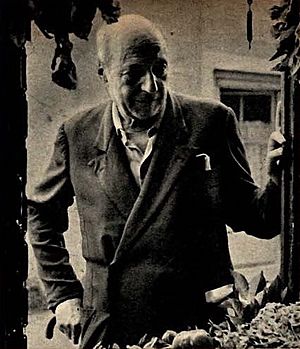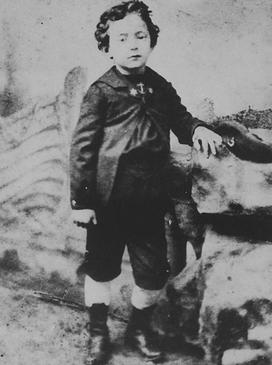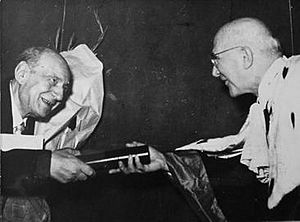Umberto Saba facts for kids
Quick facts for kids
Umberto Saba
|
|
|---|---|

Umberto Saba, 1951
|
|
| Born | Umberto Poli 9 March 1883 Trieste, Austria-Hungary |
| Died | 26 August 1957 (aged 74) Gorizia, Italy |
| Occupation | Novelist, poet |
| Language | Italian |
| Genre | Fiction, poetry |
| Literary movement | Antinovecentismo |
| Spouse | Carolina (Lina) Wölfler (m. 1909–1956; 1 child) |
| Signature | |
Umberto Saba (born Umberto Poli on March 9, 1883 – died August 26, 1957) was an important Italian poet and novelist. He was born in Trieste, a busy port city that was once part of the Austro-Hungarian Empire. Umberto Poli started using the pen name "Saba" in 1910. This name later became his official last name in 1928. From 1919, he owned a special old bookshop in Trieste. Throughout his adult life, he faced personal challenges with his health.
Contents
Early Life and Family
Umberto Saba's father, Ugo Edoardo Poli, became Jewish to marry Felicita Rachele Cohen in 1882. Umberto's father left before he was born. Young Umberto was first cared for by a kind Slovene Catholic wet-nurse named Gioseffa Gabrovich Schobar, who he called "Peppa." Peppa and her husband had just lost their own child.
From 1887, Umberto lived with his mother in her sister's home. But he always stayed very close to Peppa throughout his life.
Growing Up and Education
Umberto was a very keen reader. He loved to read books and also kept pet birds. He also learned to play the violin.
In 1897, he changed schools. He went from a traditional high school (Gymnasium) to a business college. This was called the Imperial Academy of Commerce and Navigation. After finishing there, he started working in an office that handled customs.
As a boy and young man, Umberto was quite shy. He preferred to be by himself. He had only a few close friends. These included his cousin Giorgio Fano and another famous poet from Trieste, Virgilio Giotti.
Starting His Writing Career
Umberto began writing poetry in 1900. He first signed his poems "Umberto Chopin Poli." In 1903, he went to Pisa to study things like archaeology, German, and Latin. However, he started feeling unwell and returned to Trieste in June.
After a trip to Slovenia, he spent some time in Switzerland later that year. While there, he worked on writing a play. In 1904, a socialist newspaper called Il Lavoratore published his story about visiting Montenegro. Then, in 1905, the same newspaper printed his very first published poem.
In 1905, he traveled to Florence with friends. There, he met his father for the first time. After this meeting, he changed his pen name to "Umberto da Montereale." This new name was inspired by the town where his father was born.
That summer, he met Carolina Wölfler, who he called Lina. They started writing letters to each other in December. From 1907 to 1908, he completed his required year of military service in Italy. He served in an infantry unit in Salerno.
He married Lina in a Jewish ceremony in 1909. Their daughter, Linuccia, was born the next year.
Becoming Umberto Saba
In November 1910, Umberto published his first book of poems, called Poesie. He used the name Saba for this book. This name was officially recognized as his last name in 1928.
Some people think he chose the name Saba as a tribute to his Jewish mother. This is because "Saba" sounds like Hebrew words for "being well-fed" or "grandfather." Others believe it might be similar to his wet-nurse Peppa's last name, Schobar.
In 1911, Saba visited Florence and met people who worked for an important magazine called La Voce. He started working with Mario Novaro. Soon after, Lina and Saba separated for a short time. But they were back together by May 1912.
The family then moved to Bologna. There, public readings of his poems were not very popular. Saba continued to have periods of feeling sad and periods of great creativity. In 1914, the family moved to Milan because they had no money. Saba found work as a secretary and then managed a nightclub.
In early 1915, he began writing for Benito Mussolini's newspaper, Il Popolo d'Italia. But in June, he was called into the army. He did not see any fighting and was hospitalized because of his health.
The Bookshop Owner
In 1919, Umberto Saba returned to Trieste. He bought a second-hand bookshop called Mailänder. He changed its name to La Libreria Antica e Moderna. This business made enough money to support his family.
Saba became very interested in buying and selling rare old books. He enjoyed traveling a lot for his work. After his friend Giotti also returned to Trieste in 1919, Saba and Giotti started meeting daily. They worked together on artistic projects. Giotti designed the logo for Saba's bookshop. He also helped with and illustrated a small book for Saba's Cose leggere e vaganti. Saba, in turn, published Giotti's book Il mio cuore e mia casa at his library.
However, after Giotti's sister died in 1929, his friendship with Saba became difficult. By the 1930s, they even avoided seeing each other.
In 1921, Saba published the first version of his famous Songbook himself. Later, he added more poems to it. Eventually, it had over four hundred poems written over fifty years. In 1929, he began working with a famous psychoanalyst named Edoardo Weiss in Trieste. Weiss was a student of Freud.
Later Years and Recognition
In 1939, new laws against Jewish people were announced. Saba tried to get an exception from these laws. But he did not want to be baptized into the Catholic faith. So, in 1940, he sold his bookshop to his long-time assistant and friend, Carlo Cerne.
When the armistice between Italy and Allied armed forces was announced in 1943, Saba and his family fled Trieste. They went to Florence and moved to eleven different hiding places over 12 months to avoid being sent away. After this, Lina returned to Trieste, and Saba moved to Rome. In Rome, he oversaw the publication of Scorciatoie e raccontini, a collection of his wise sayings.
In 1946, Saba won the Viareggio Prize, a major Italian literary award. He then returned to Trieste. The next year, he caused a big discussion with his article If I were named governor of Trieste. In this article, he shared his strong opinions about the city's future.
In 1953, when he was 70 years old, the University of Rome gave him an honorary doctorate degree. This is a special award for his achievements. He also received an award from the Lincean Academy.
Umberto Saba passed away at the age of 74 in Gorizia. This was nine months after he had a heart attack and a year after his wife, Lina, died.
Jewish Heritage in His Work
Umberto Saba's Jewish background was important in his writing. His 1948 essay "Storia e cronistoria del Canzoniere" ("History and chronology of song-writing") shares details about his own life.
In "Gli Ebrei" (The Jews), which is part of his 1956 book "Ricordi-Racconti 1910–1947" ("Records and Stories 1910–1947"), he describes what life was like for the Jewish community in Trieste when he was a child. His 1952 work "Vignette di vita giudaica" ("Vignettes of Jewish life") includes a description of Samuel David Luzzatto. Luzzatto was his mother's uncle. Saba's writings show that he knew both Hebrew and the special Jewish dialect spoken in Trieste.
Major Works
- Poems (1911)
- With My Eyes (1912)
- What Remains for Poets To Do (1912)
- Songbook (1921)
- Prelude and Songs (1923)
- Autobiography (1924)
- The Prisoners (1924)
- Figures and Songs (1926)
- Prelude and Flight (1928)
- Words (1934)
- A Small Town Team (1939)
- Last Things (1944)
- Mediterranean (1947)
- Scorciatoie e raccontini (1946)
- Birds – Nearly a Story (1951)
- Ernesto (written 1953, published 1975)
See also
 In Spanish: Umberto Saba para niños
In Spanish: Umberto Saba para niños
 | Charles R. Drew |
 | Benjamin Banneker |
 | Jane C. Wright |
 | Roger Arliner Young |



